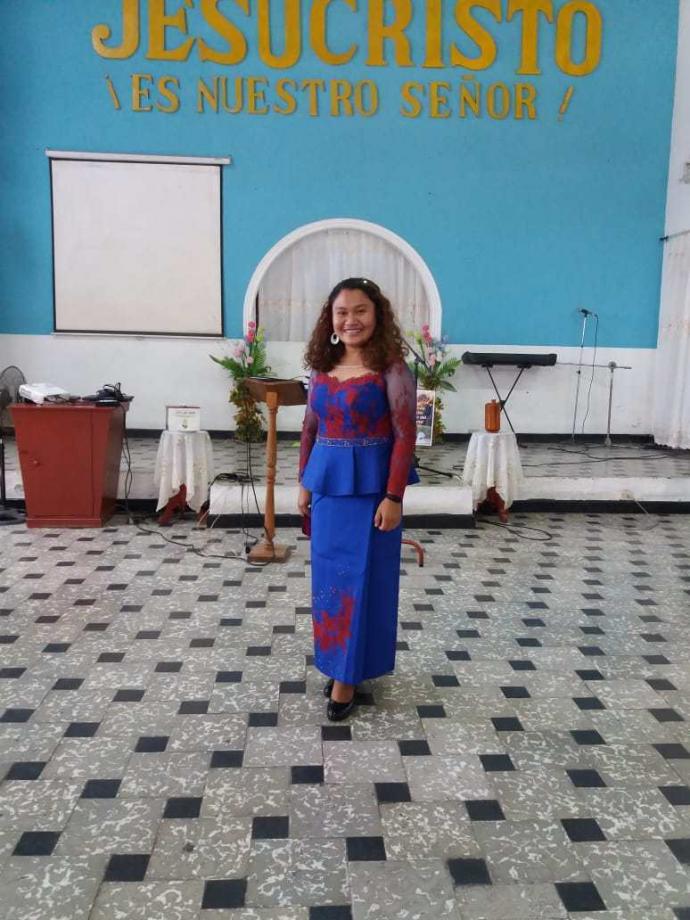

This story was written in February 2020, before the COVID-19 pandemic became a worldwide threat. As of April 2020, Minear Mak is still serving in her YAMEN assignment, remaining in close contact with MCC and MWC administrators as health and government guidelines continue to change. Some YAMEN participants have returned home early from their assignments, but many remain in service. As next year’s placement terms are planned, MCC and MWC will be applying health and government guidelines to each case. YAMEN is the Young Anabaptist Mennonite Exchange Network.
One evening, a few months into her time living in the city of Cali, Colombia—where she attends a Mennonite Brethren church, Iglesia Filadelfia—Minear Mak’s host family made spaghetti for dinner. And to her complete disbelief, they were going to eat it with a fork.
Minear Mak, born and raised in Cambodia, couldn’t imagine using anything other than chopsticks to eat a meal comprised primarily of noodles. She decided a lesson in chopstick usage was in order. What followed was a giggle-filled evening of dropped noodles and, eventually, chopstick mastery as Minear Mak shared of her culture, her life, with her Colombian family.
This is precisely the kind of cross-cultural experience Minear Mak had in mind when a friend of hers who attends Phnom Penh Mennonite Church suggested she look into signing up for a one-year term with Young Anabaptist Mennonite Exchange Network (YAMEN).
YAMEN offers young adults from around the world an opportunity to leave what they know for a year to serve, grow and learn in an international placement. YAMEN is a joint program of Mennonite Central Committee (MCC) and Mennonite World Conference (MWC).
Minear Mak serves at Colegio Américas Unidas (United Americas School) in Cali, a school founded by Mennonite Brethren missionaries in 1966. She says working as an assistant, helping prepare lessons and working with students, has been a satisfying and rewarding experience.
“I love giving my time to a student who is unmotivated to learn and reaching out to kids who are mostly silent and slow in getting things done,” she says. “I love doing high-fives with kids and seeing them feel accomplished.
“I’ve also led games and activities for the older kids to improve their speaking and comprehension. It’s fun for me and also valuable because I’m still a beginner with Spanish and it helps us build relationships.”
Chopsticks versus forks is hardly the only cultural difference between Cambodia and Colombia. Being here with her host family and attending an MB church, Iglesia Filadelfia, Minear Mak says, has helped her learn more about what she wants her identity to be grounded in—her faith.
“It’s not about being Asian or Latina but being a woman that adorns the beauty of Christ, who is not going to comply with the world but to be the salt and light,” she says. “This will bring about mutual transformation: changes in me and changes in those I encounter.”
And that transformation has already begun, says Minear Mak.
“It is a privilege to understand God’s calling for me through the people that I am working with, living with and hanging out with, whether they are middle-schoolers, a single woman, a working mom, a missionary, a teacher, a housewife, a pedestrian or a passenger on a bus,” she says. “I have learned a lot to be more patient and to rejoice in the day that the Lord has made. I’m transforming into the woman that God has called me to be.”
A Mennonite World Conference and Mennonite Central Committee joint release by Jason Dueck, a writer for Mennonite Central Committee Canada who lives in Winnipeg.


Mennonite Central Committee is a global, nonprofit organization that strives to share God’s love and compassion for all through relief, development and peace. MCC is committed to relationships with their local partners and churches. As an Anabaptist organization, they strive to make peace a part of everything they do.






















